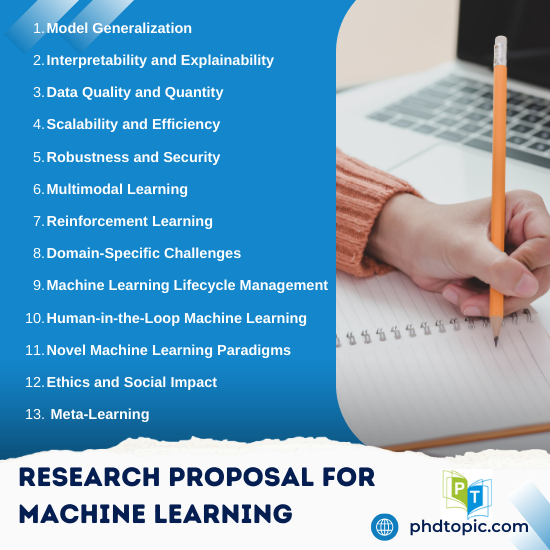Creating a perfect research proposal is necessary we abide by your university rules and draft a perfect proposal as per your needs. Machine learning research is a fastest growing field that surrounds a wide range of problems and obstacles. It gets advanced day-by-day with new techniques or novel tools.
Some efficient problems provided by us that are presently aims on machine learning research or possible rising topics of interest,
- Model Generalization
- Overfitting vs. Underfitting: Making sure our models contain accurate balance within bias and variance.
- Transfer Learning: The capability of models is improved to spread lessons from one field to another.
- Interpretability and Explainability
- Black Box Models: We create methods for understanding and clarify decisions invoked by complicated models, especially in deep neural networks.
- Trustworthy AI: Models are designed for distributing definable outcomes that are believed by users.
- Data Quality and Quantity
- Lack of Labeled Data: Preparing the paths for well-trained models with restricted or unlabelled data like semi-supervised, unsupervised learning and self-supervised learning.
- Data Bias and Fairness: The techniques are established by us to identify and reduce biases in datasets and models to check its morality and generality.
- Scalability and Efficiency
- Computational Efficiency: Constructing a model that is less approximately valuable to train and utilize.
- Scaling to Big Data: Our machine learning algorithms are assured for measuring practically the rising amount of datasets.
- Robustness and Security
- Adversarial Attacks: Comprehending and safeguarding against attacks where models are purposely tricked by inputs that are created to fool them (adversarial instances).
- Privacy Preservation: We investigate privacy-preserving machine learning methods like federated learning and differential privacy.
- Multimodal Learning
- Cross-modal Data Processing: The algorithms are generated by us that perform and connect information from several data sources such as text, audio, images, etc.
- Integrating Heterogeneous Data: Through these datasets, we learn where the data types are dissimilar and organised differently.
- Reinforcement Learning
- Sample Efficiency: Reinforcement learning algorithms ability is enhanced for learning practically from lesser communication with the environment.
- Real-world Application: We convert the achievement of RL in games and imitations to real-world and practical applications.
- Domain-Specific Challenges
- Healthcare: Our models originated for disease prediction, drug discovery and personalized medicine during checking the privacy and supervisory observance.
- Climate Change: Machine Learning is approached for climate models to forecast environmental changes and their effects perfectly.
- Agriculture: Yield prediction in agriculture is advanced, identifying the disease in crops and improving resources.
- Machine Learning Lifecycle Management
- Model Deployment: We facilitate the applications of machine learning models into creation.
- Model Monitoring and Maintenance: System is evolved for observing the performance of models across time and upgrading models as data and in-terms change.
- Human-in-the-Loop Machine Learning
- Interactive Machine Learning: The techniques are surveyed for involving the human reviews efficiently into the learning process.
- Collaborative AI: AI (Artificial Intelligence) systems are developed by us for performing interactively with humans.
- Novel Machine Learning Paradigms
- Neuro-Symbolic AI: Integrating the neural networks with symbolic reasoning to form our model for learnin g and reasoning.
- Quantum Machine Learning: In what way the quantum computing applicable in latest machine learning algorithms is evaluated.
- Ethics and Social Impact
- Algorithmic Accountability: We originate techniques to maintain algorithms that are responsible for their decisions and effects.
- Social Impacts of ML: Understanding and solving the social consequences of utilizing machine learning that incorporates work removal and privacy concerns.
- Meta-Learning
- Learning to Learn: Depending on experiences (meta learning), systems are constructed by us to progress their learning algorithms.
These mentioned research problems are not only theoretically challenging but also contain efficient practical results. The result of issues is enhancements over different fields like healthcare, finance, autonomous systems, over and above. It is very important that researchers view not only the technical aspects but also the moral, legal and people-driven effects of their work in machine learning.
Machine Learning Research Proposal Writing Service
Generally, topics must gain valuable insight the topics that we hare will uncover new facts. Gain highly focus topics from phdtopic.com Go through the recent work of our team that we have worked out.
- Automatic document retrieval using SVM machine learning
- Stealing Hyperparameters in Machine Learning
- On the Performance of Machine Learning Models for Anomaly-Based Intelligent Intrusion Detection Systems for the Internet of Things
- Leveraging Shallow Machine Learning to Predict Business Process Behavior
- A Machine Learning Based Quantitative Data Analysis for Screening Skin Abnormality Based on Optical Coherence Tomography Angiography (OCTA)
- A Novel Attack on Machine-Learning Resistant Physical Unclonable Functions
- A comparison between heuristic and machine learning techniques in fall detection using Kinect v2
- MLtool: A Tool to Automate the Construction, Evaluation, and Selection of Machine Learning Models
- Machine Learning to Detect Inconsistent Data
- Identification of Fake accounts in social media using machine learning
- An Exploratory analysis of Machine Learning adaptability in Big Data Analytics Environments: A Data Aggregation in the age of Big Data and the Internet of Things
- Resource Sharing Platform Based on Machine Learning and Data Fusion Technology
- VMPBL: Identifying Vulnerable Functions Based on Machine Learning Combining Patched Information and Binary Comparison Technique by LCS
- Machine Learning for Multiobjective Evolutionary Optimization in Python for EM Problems
- Development of a New Broadcast Protocol Based on Machine Learning for Wide-Ranging MANET Environments
- Application of DM in data safety of machine learning based on combined grey neural network
- Web based machine learning for language identification and translation
- Cryptocurrency Price Trend Analysis via Machine Learning Methods
- Survival Probability Assessment using Machine Learning Algorithms
- Multivariate Machine Learning Methods for Fusing Multimodal Functional Neuroimaging Data

